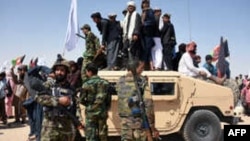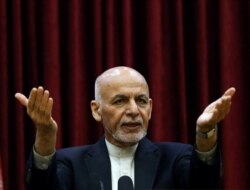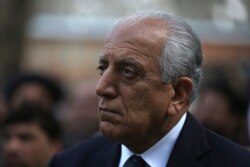The Taliban have announced a temporary cease-fire in Afghanistan during the three-day Muslim festival of Eid al-Fitr starting Sunday, a move the United States hailed as “a momentous opportunity” to advance peace efforts in the war-torn country.
Afghan President Ashraf Ghani quickly reciprocated the insurgent announcement by ordering government forces to observe their own truce during the festivities, which mark the end of Islamic fasting month of Ramadan.
“In order that our countrymen may celebrate their Eid festivities in ease and comfort, the leadership of the Islamic Emirate of Afghanistan orders all the mujahedeen … not to attack the enemy in any place,” a Taliban statement said.
The Islamist group instructed its fighters, however, to give “a befitting defensive response” if they come under attack from Afghan forces anywhere in the country.
The Taliban statement, however, barred members from going into government-controlled areas during the festivities, or allowing Afghan forces to come into insurgent-held territory, for that matter.
Deadly clashes
The unexpected insurgent cease-fire announcement came as weeks of fighting between Taliban and Afghan security forces killed and injured hundreds of people across the country. The United Nations said the fighting had killed and injured nearly 500 Afghan civilians since the beginning of April, and it blamed both sides for the casualties.
“I welcome the cease-fire announcement by the Taliban. … As Commander in Chief, I have instructed ANDSF [Afghan National and Defense Forces] to comply with the three-days truce and to defend only if attacked,” Ghani tweeted late Saturday.
A spokesman for Afghanistan’s national security council, Javid Faisal, said Saturday that Taliban attacks during Ramadan had killed at least 146 civilians and wounded 430 others, though both the warring sides often issue inflated battlefield claims.
In response to the cease-fire announcements by Afghan and Taliban officials, Zalmay Khalilzad, the U.S. peace envoy for the country, said, “This is a momentous opportunity that should not be missed. The U.S. will do its part to help.”
Khalilzad, who negotiated and signed a peace-building agreement with the Taliban in February, said in a series of tweets that Saturday’s development offered the opportunity to accelerate the Afghan peace process.
Stephane Dujarric, spokesperson for U.N. Secretary-General Antonio Guterres, said in a statement the secretary general “urges all parties concerned to seize this opportunity and embrace an Afghan-led and Afghan-owned peace progress.” He added, “Only a peace settlement can bring an end to the suffering in Afghanistan.”
The U.N. Assistance Mission in Afghanistan tweeted Saturday, “The Afghan people deserve a respite from violence. The U.N. urges parties to respect the halt to fighting & urgently look to make it permanent. Intra-Afghan peace negotiations need to start.”
Cease-fire two years ago
In 2018, the Taliban also declared an Eid cease-fire. At the time, insurgent fighters had moved beyond front lines into government areas, while Afghan forces were allowed into Taliban-held territory, hugging each other, sharing ice cream and taking cellphone selfies.
Those images went viral in social media. But with the latest insurgent Eid cease-fire order, critics said the Taliban seem to have discouraged taking such images, as it suggested insurgent fighters were tired of the war.
Afghan leaders, as well as U.N. and U.S. officials in recent days, have repeatedly called on the Taliban to declare a “humanitarian cease-fire” or reduce violence to allow health workers to deal with the coronavirus outbreak in the country.
But the insurgent group turned down those calls. Instead, the Taliban demanded the speedy release of its 5,000 prisoners from Afghan jails, citing provisions of the U.S.-Taliban agreement.
As part of the agreement, the Taliban must free 1,000 government personnel in exchange for insurgent inmates. But so far, Kabul has set free about 1,000 insurgents while the Taliban have released fewer than 300 detainees.
The prisoner swap, if and when it is completed, would lead to the opening of peace talks between Afghan parties to the war to negotiate a permanent cease-fire and a future power-sharing arrangement in Afghanistan.
"Other positive steps should immediately follow: the release of remaining prisoners as specified in the U.S.-Taliban agreement by both sides, no returning to high levels of violence, and an agreement on a new date for the start of intra-Afghan negotiations,” Khalilzad emphasized in his tweets Saturday.
The U.S.-Taliban pact requires American and coalition forces to withdraw from Afghanistan by mid-July 2021, in return for Taliban counterterrorism assurances and pledges to seek political reconciliation with other Afghan groups to end the violence.


